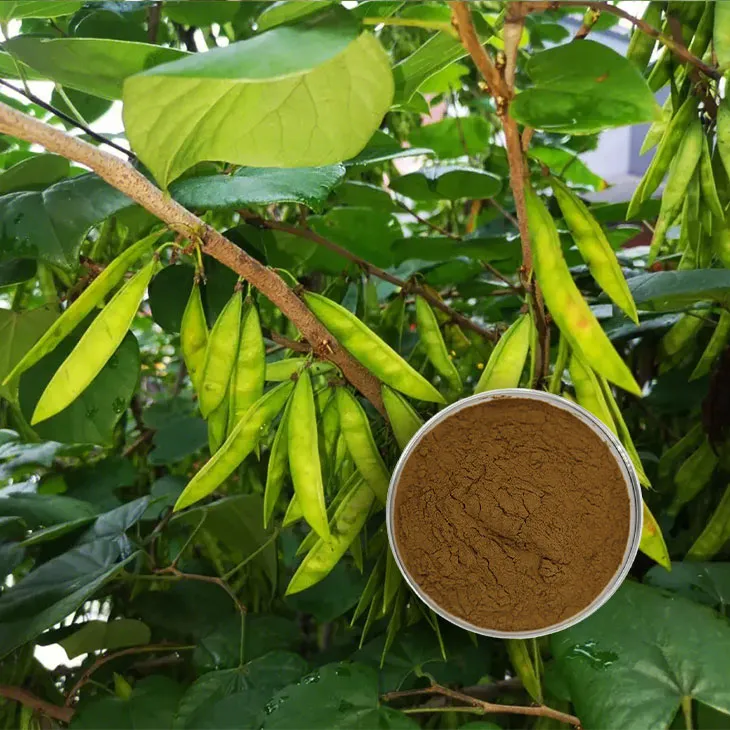- 0086-571-85302990
- sales@greenskybio.com
Use saponin extracts? Make sure you source from sustainable suppliers!
2024-12-19

1. Introduction
Saponin Extracts are becoming increasingly important in various industries, including pharmaceuticals, cosmetics, and food. They possess unique properties such as surfactant activities, antioxidant effects, and potential health benefits. However, as the demand for Saponin Extracts rises, it is crucial to ensure that they are sourced from sustainable suppliers. This article will explore the reasons why sustainable sourcing of Saponin Extracts is essential, covering aspects from resource conservation to quality assurance.

2. The Importance of Saponin Extracts
Saponin extracts have a wide range of applications. In the pharmaceutical industry, they are being studied for their potential anti - cancer, anti - inflammatory, and immunomodulatory properties. For example, some saponin - based drugs are in development for treating certain types of cancers. In cosmetics, saponins are used in skin - care products due to their ability to cleanse the skin gently and their antioxidant properties, which can help in reducing skin aging. In the food industry, they can act as natural emulsifiers and foaming agents.

3. Resource Conservation
3.1. Plant - based Saponin Sources
Most saponin extracts are derived from plants. Many of these plants are native to specific regions and may be at risk of over - harvesting. For instance, some medicinal plants that are rich sources of saponins, like ginseng, are slow - growing. Unsustainable harvesting of these plants can lead to a decline in their populations, which not only affects the availability of saponin extracts but also disrupts the local ecosystems.
By sourcing from sustainable suppliers, we can ensure that the plants are harvested in a way that allows for their regeneration. Sustainable suppliers often follow practices such as proper harvesting seasons, leaving enough plants for seed production, and promoting the growth of the plant species in their natural habitats.
3.2. Wildlife and Habitat Protection
In some cases, the plants that produce saponins are an important part of the habitat for wildlife. For example, certain butterflies and bees may rely on the nectar of these plants. If the plants are over - harvested, it can lead to a loss of food sources for these insects, which in turn can have a ripple effect on the entire ecosystem. Sustainable sourcing helps in protecting these habitats and the wildlife that depends on them.

4. Quality Assurance
4.1. Standardized Production Processes
Sustainable suppliers are more likely to have standardized production processes. They follow strict guidelines for harvesting, extraction, and purification of saponin extracts. This ensures that the final product is of consistent quality. For example, in a well - managed sustainable operation, the extraction process will be optimized to obtain the maximum amount of active saponin components while minimizing impurities.
4.2. Traceability
Sourcing from sustainable suppliers also provides better traceability. This means that it is easier to track the origin of the saponin extracts, from the plant source to the final product. In case of any quality issues or regulatory requirements, being able to trace the source can be crucial. For instance, if there is a suspicion of contamination in a batch of saponin - based cosmetics, it is possible to quickly identify the source of the problem and take appropriate actions.

5. Meeting Regulatory Requirements
Many countries and regions have regulations regarding the sourcing of natural products like saponin extracts. These regulations are often aimed at protecting the environment, ensuring fair trade, and safeguarding consumer health. Sustainable suppliers are more likely to be compliant with these regulations. For example, some regulations require that plants are harvested in a sustainable manner, and sustainable suppliers can provide the necessary documentation to prove compliance.
In the pharmaceutical industry, strict regulatory requirements are in place for the raw materials used in drug production. Sourcing saponin extracts from sustainable suppliers can help pharmaceutical companies meet these requirements and avoid potential legal issues.
6. Social and Ethical Considerations
6.1. Fair Trade
Sustainable suppliers often adhere to fair trade principles. This means that the farmers or collectors who supply the plants for saponin extraction are paid fairly for their work. Fair trade also promotes better working conditions and community development. For example, in some developing countries where saponin - rich plants are harvested, fair trade initiatives have led to the improvement of local infrastructure and education facilities.
6.2. Indigenous Rights
In some regions, the plants used for saponin extraction are part of the traditional knowledge of indigenous communities. Sustainable sourcing respects the rights of these indigenous communities. It ensures that their knowledge and resources are not exploited without their consent. For example, some sustainable suppliers work in partnership with indigenous communities, sharing the benefits of saponin extraction in a fair and equitable manner.
7. How to Identify Sustainable Suppliers
7.1. Certification
Look for suppliers who have relevant certifications. For example, certifications such as Fairtrade, Organic, or Forest Stewardship Council (FSC) can indicate that the supplier follows sustainable practices. These certifications are usually awarded after a thorough assessment of the supplier's operations, including their sourcing methods, production processes, and environmental and social impacts.
7.2. Transparency
A sustainable supplier should be transparent about their operations. They should be able to provide information about their plant sources, harvesting methods, and production facilities. Transparency also extends to their supply chain, including how they deal with subcontractors. For instance, a reliable supplier will be able to tell you exactly where the plants for saponin extraction are grown and how they are harvested.
7.3. Long - Term Commitment
Sustainable suppliers typically have a long - term commitment to environmental and social sustainability. They invest in research and development to improve their sustainable practices, such as finding more efficient extraction methods that are less harmful to the environment. A supplier with a long - term vision is more likely to be a reliable source of saponin extracts in the long run.
8. Conclusion
Saponin extracts are valuable resources with a wide range of applications. However, to ensure their long - term availability, quality, and ethical sourcing, it is essential to source them from sustainable suppliers. By considering factors such as resource conservation, quality assurance, regulatory compliance, and social and ethical considerations, we can make informed decisions when choosing suppliers of saponin extracts. This not only benefits the industries that rely on these extracts but also contributes to the protection of the environment, the well - being of local communities, and the overall sustainability of our planet.
FAQ:
Question 1: What are saponin extracts?
Saponin extracts are natural compounds that can be found in various plants. They have diverse properties and are used in different industries such as pharmaceuticals, cosmetics, and food. Saponins often have surfactant - like qualities, which can be useful for things like creating foams or emulsifying substances.
Question 2: Why is it important to source saponin extracts from sustainable suppliers?
There are several reasons. Firstly, from a conservation perspective, sustainable sourcing ensures that the plants from which saponins are extracted are not over - harvested, protecting the natural ecosystems. Secondly, sustainable suppliers are more likely to follow ethical and legal practices. Also, it helps in maintaining a stable supply in the long - run. And often, sustainable sourcing is associated with better quality control, which is crucial for industries relying on saponin extracts.
Question 3: How can one identify a sustainable supplier of saponin extracts?
Look for certifications such as organic certifications which often imply sustainable farming practices. Check if the supplier has a traceability system in place for their raw materials. A sustainable supplier will also be able to provide information about their sourcing methods, including details about the plant species, their origin, and how they ensure conservation during extraction. Additionally, reviews and reputation in the industry can be a good indicator.
Question 4: Are there any regulations regarding the sustainable sourcing of saponin extracts?
Yes, there are some regulations and guidelines in place. In the pharmaceutical and food industries, for example, there are often strict quality and sourcing requirements. Some countries have environmental protection laws that impact the harvesting of plants for saponin extraction. International organizations also promote sustainable sourcing through various initiatives and standards.
Question 5: What are the consequences of not sourcing saponin extracts from sustainable suppliers?
The consequences can be significant. It may lead to the depletion of plant species, which can disrupt ecosystems. There could also be a decline in the quality of the saponin extracts over time due to over - exploitation of the source plants. Additionally, non - sustainable sourcing may involve unethical practices such as illegal harvesting, which can have negative impacts on local communities and the environment.
Related literature
- Sustainable Sourcing of Phytochemicals: The Case of Saponin Extracts"
- "Saponin Extracts: From Source to Sustainability"
- "The Importance of Sustainable Suppliers in the Saponin Extract Market"
- ▶ Hesperidin
- ▶ citrus bioflavonoids
- ▶ plant extract
- ▶ lycopene
- ▶ Diosmin
- ▶ Grape seed extract
- ▶ Sea buckthorn Juice Powder
- ▶ Beetroot powder
- ▶ Hops Extract
- ▶ Artichoke Extract
- ▶ Reishi mushroom extract
- ▶ Astaxanthin
- ▶ Green Tea Extract
- ▶ Curcumin Extract
- ▶ Horse Chestnut Extract
- ▶ Other Problems
- ▶ Boswellia Serrata Extract
- ▶ Resveratrol Extract
- ▶ Marigold Extract
- ▶ Grape Leaf Extract
- ▶ blog3
- ▶ blog4
- ▶ blog5
-
Pure 85% Tomentil Extract.
2024-12-19
-
Maca Extract
2024-12-19
-
Pueraria Lobata Extract
2024-12-19
-
Cactus Extract
2024-12-19
-
Medicinal Marshmallow Extract
2024-12-19
-
Dandelion Leaf Extract
2024-12-19
-
Nettle Root Extract
2024-12-19
-
Hops Extract
2024-12-19
-
Tongkat Ali Extract Powder
2024-12-19
-
Almond Extract Powder
2024-12-19
-
Sophora Japonica Flower Extract
2024-12-19





















